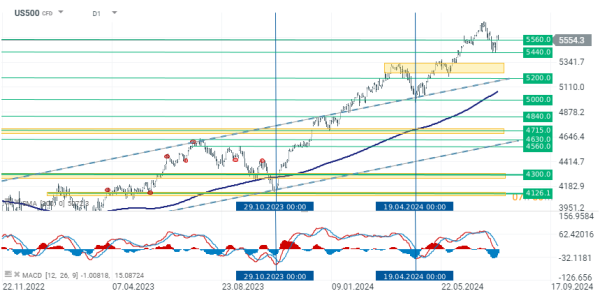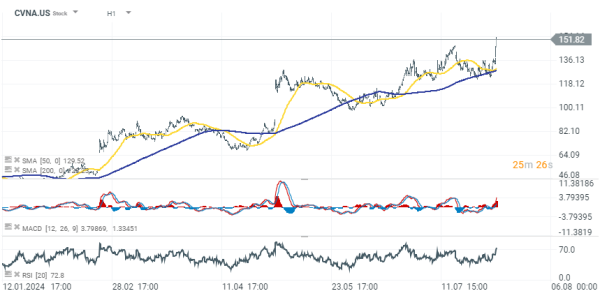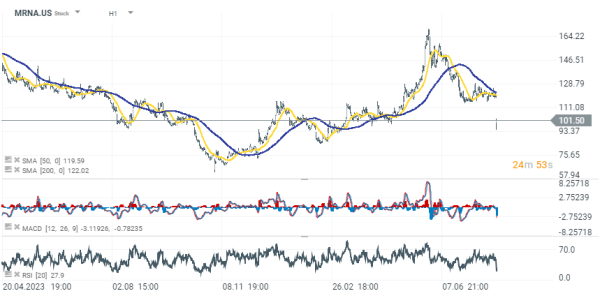US Open: Wall Street mixed after weak ISM data 🧭
- US100 and US500 indices open roughly flat
- Small-cap companies lose after ISM data
- Dollar erases early gains
- 10-year bond yields below 4.0%
This week is full of important information for stock market investors. Investors have not yet fully analyzed yesterday's Fed decision and Jerome Powell's speech, and today, just after the start of the cash session, they received another data set, this time the ISM for manufacturing. The report turned out to be much weaker than expected, with all components along with the main indicator falling lower except for the price subindex, which is an even worse scenario. Prices, however, fell quite significantly, confirming lower inflationary pressure. Notably, the labor market is deteriorating. The employment subindex came in at 43.4 points versus an expected 49.0 and 49.3 previously. This is a very low reading. Given the mention of the dual mandate and labor market issues in yesterday's Fed statement, low ISM data and higher unemployment benefits increase the chances of rate cuts at the September meeting. However, after the data was released, the market saw more confusion than euphoria, as investors are now turning their attention to the potential for a recession. Much worse data may paradoxically increase sell-offs, contrary to what we have seen recently.
In the stock market, small-cap companies are faring the worst today. US2000 is down 1.60%. This is because small businesses will feel the effects of a slowing economy the most. US100 is also experiencing declines, but limited to -0.60% at the time of publication.
US500
The main US500 index is down 0.20%, the least among those mentioned above. Despite the mixed sentiment, we are currently seeing a rebound after a local low around 5440 points.

Source: xStation 5
Company news
Meta Platforms (META.US) gains 7% after reporting better-than-expected Q2 results, with operating income up by 58%. The company also noted a 7% increase in family daily active people, a 10% rise in ad impressions, and a 10% increase in the average price per ad. Meta projects Q3 sales between $38.5B and $41B, above the consensus of $39.2B, and raised its 2024 capex range to $37B-$40B.
Carvana (CVNA.US) jumped by over 12% following strong Q2 results. The company reported a profit of $0.14 per share, reversing a loss of $0.55 per share a year ago, and beating expectations for a loss of $0.12 per share. Total revenue increased by 15% to $3.41B, with adjusted EBITDA more than doubling to $355M. Carvana sold over 101K vehicles in the quarter, a 33% Y/Y increase, and expects adjusted EBITDA of $1.0B to $1.2B for FY24.

Teladoc Health (TDOC.US) dips 6% after the telehealth provider withdrew its 2024 financial guidance and three-year business outlook following mixed Q2 results. For 2024, the company projects revenue growth in the Integrated Care segment to be in the low to mid-single digits compared to 2023.
Arm Holdings (ARM.US) plunged by 11.70% despite exceeding FQ1 expectations. The company's midpoint outlook for FQ2, with adjusted earnings projected between $0.23 and $0.27 per share, fell short of market expectations, suggesting $0.25 compared to the consensus of $0.28. Revenue is expected to range from $780M to $830M.
Moderna (MRNA.US) declines by 14% after the company reduced its FY2024 outlook for product sales due to lower COVID vaccine sales. Despite exceeding Q2 expectations, total revenue declined 30% Y/Y, with net product sales dropping 73% to $184M. The company revised its net product sales guidance to $3B-$3.5B from around $4.5B.

Hershey (HSY.US dropped 2.0% after reporting Q2 results below expectations and issuing softer profit guidance. Q2 revenue fell 16.7% Y/Y with organic sales down 16.8%, including a 22% decline in the North America Confectionary segment. Adjusted gross margin decreased by 200 basis points, and adjusted operating profit plunged 32.8%. For FY24, Hershey expects revenue around $11.4B and EPS of $9.49 to $9.59.